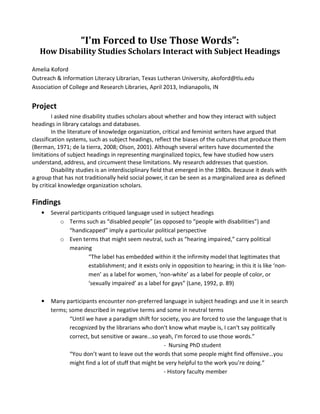
ACRL Disability Studies - Handout
- 1. “I'm Forced to Use Those Words”: How Disability Studies Scholars Interact with Subject Headings Amelia Koford Outreach & Information Literacy Librarian, Texas Lutheran University, akoford@tlu.edu Association of College and Research Libraries, April 2013, Indianapolis, IN Project I asked nine disability studies scholars about whether and how they interact with subject headings in library catalogs and databases. In the literature of knowledge organization, critical and feminist writers have argued that classification systems, such as subject headings, reflect the biases of the cultures that produce them (Berman, 1971; de la tierra, 2008; Olson, 2001). Although several writers have documented the limitations of subject headings in representing marginalized topics, few have studied how users understand, address, and circumvent these limitations. My research addresses that question. Disability studies is an interdisciplinary field that emerged in the 1980s. Because it deals with a group that has not traditionally held social power, it can be seen as a marginalized area as defined by critical knowledge organization scholars. Findings • Several participants critiqued language used in subject headings o Terms such as “disabled people” (as opposed to “people with disabilities”) and “handicapped” imply a particular political perspective o Even terms that might seem neutral, such as “hearing impaired,” carry political meaning “The label has embedded within it the infirmity model that legitimates that establishment; and it exists only in opposition to hearing; in this it is like ‘non- men’ as a label for women, ‘non-white’ as a label for people of color, or ‘sexually impaired’ as a label for gays” (Lane, 1992, p. 89) • Many participants encounter non-preferred language in subject headings and use it in search terms; some described in negative terms and some in neutral terms “Until we have a paradigm shift for society, you are forced to use the language that is recognized by the librarians who don't know what maybe is, I can't say politically correct, but sensitive or aware...so yeah, I'm forced to use those words.” - Nursing PhD student “You don’t want to leave out the words that some people might find offensive…you might find a lot of stuff that might be very helpful to the work you’re doing.” - History faculty member
- 2. • Several participants rarely or never use subject headings o Reasons: Too broad; haven’t found them useful; haven’t noticed them; didn’t like using non- preferred terms o Those in the “low-scatter” disciplines of law and nursing seem to make the most use of subject headings; “low-scatter” disciplines are those with clear boundaries and well-organized bodies of literature (Mote, 1962) • Participants supplement or replace subject headings with other search strategies, the most common of which was choosing global search tools over specialized databases o Possible reasons: Serendipity; lack of a single database for disability studies; alleviate uncertainty about not finding enough Conclusions • Research in emerging, interdisciplinary, and identity-based fields requires flexibility and creativity • Scholars are interested in discussing political implications of terms with librarians • Idiosyncratic search strategies, such as ignoring subject headings or choosing global search tools over specialized databases, might be skilled responses to the characteristics of a field Thesis This research is part of a larger project, which I report on in my master’s thesis. It is available in the University of Texas Digital Repository. “Strong Views About What You Call Things”: How Disability Studies Scholars Interact with Information Classification Systems http://repositories.lib.utexas.edu/handle/2152/ETD-UT-2012-05-5699 References Berman, S. (1971). Prejudices and antipathies: A tract on the LC subject heads concerning people. Metuchen, NJ: Scarecrow Press. de la tierra, t. (2008). Latina lesbian subject headings: The power of naming. In K. R. Roberto (Ed.), Radical cataloging: Essays at the front (pp. 94–102). Jefferson, NC: McFarland. Lane, H. (1992). The mask of benevolence: Disabling the deaf community. New York: Knopf. Mote, L. (1962). Reasons for the variations in the information needs of scientists. Journal of Documentation, 18(4), 169–175. Olson, H. A. (2001). The power to name: Representation in library catalogs. Signs, 26(3), 639–668.
